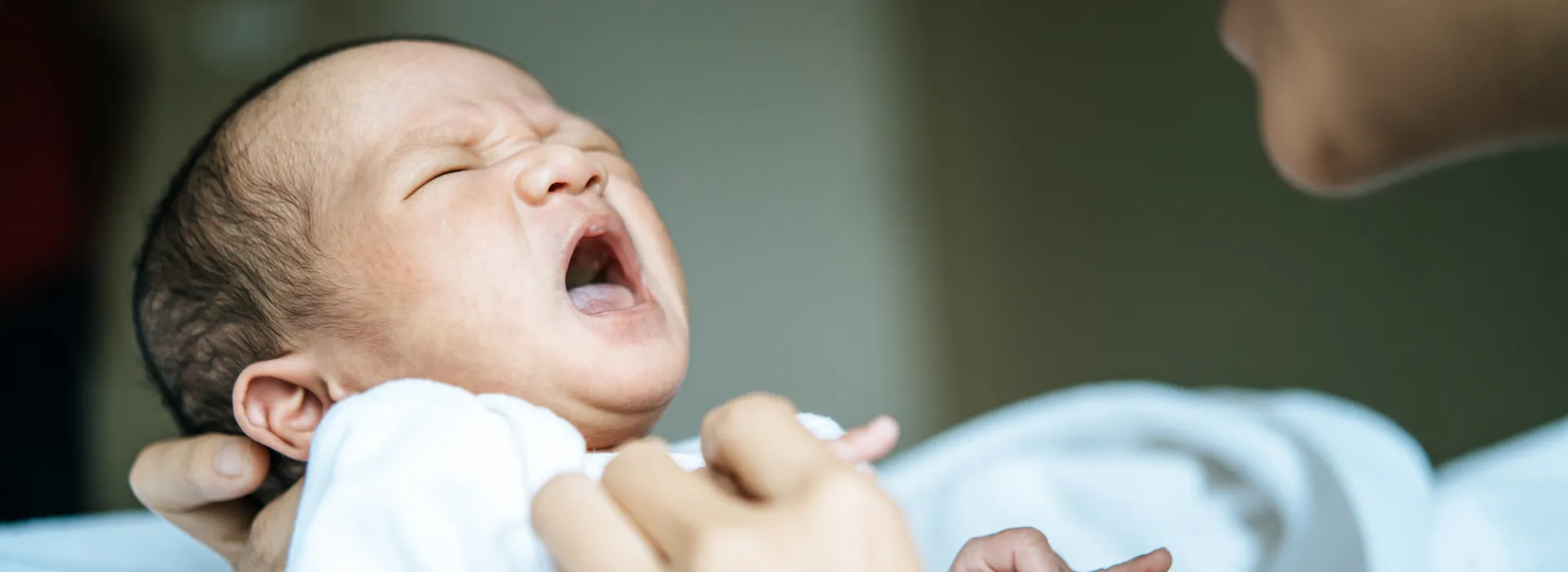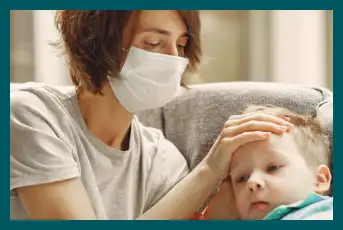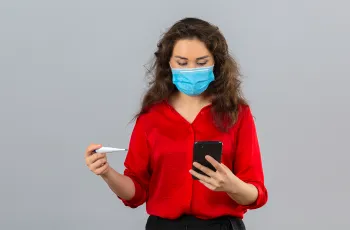How To Break a Fever in a Baby? Management and Treatment at Home
Written by Dr Nelson Lau, MBBS FRACGP, GP & Digital Health Specialist

Contents

As a new parent, few things are more worrying than your little one running a fever. Those rosy cheeks and warm forehead can send even the calmest moms and dads into a panic. But before you start Googling worst-case scenarios, take a deep breath. Fevers are a sign that your baby's body is fighting off an infection or illness. The key is knowing how to manage the fever safely and when to consult a doctor.
Signs & symptoms of a fever in babies
Unlike adults, babies can't tell you when they're feeling under the weather. So, it's important to watch for these common signs of a fever:- Flushed cheeks
- Warm or hot skin
- Irritability or fussiness
- Decreased appetite
- Lethargy or sleepiness
When are infants considered to have a fever?
The definition of a fever varies slightly by age:- Under 3 months: 38°C or higher
- 3-6 months: 38.3°C or higher
- Over 6 months: 38.9°C or higher
How to treat a fever in a baby at home?
If your little one has a mild fever, there are several safe and effective home remedies you can try:- Give them plenty of fluids: Breastmilk, formula, or water (for babies over 6 months) can help prevent dehydration.
- Dress them lightly: Overdressing can trap body heat and raise the fever. Stick to lightweight clothing and avoid bundling.
- Give them a lukewarm bath: This can help bring down a high fever gradually. Avoid cold baths, as they can cause shivering and raise the body temperature.
- Use over-the-counter medication: For babies over 6 months, you can give paracetamol or ibuprofen to reduce fever and discomfort. Always follow dosage instructions carefully.
- Keep them comfortable: Offer plenty of cuddles, read stories, or put on a soothing movie. A calm, relaxed environment can help your little one rest and recover.
- Monitor the fever: Check their temperature every few hours to ensure it doesn't rise too high or persist for too long.
What to avoid?
While home remedies can be helpful, there are a few things you'll want to steer clear of:- Alcohol baths or rubbing alcohol on the skin (can be absorbed through the skin and cause poisoning)
- Aspirin (can cause serious side effects in children under 16yo)
- Overdressing or bundling (can trap heat and raise the fever)
When to consult a doctor?
In most cases, a mild fever in a baby is nothing to worry about. However, there are certain situations where you should seek medical attention:- Fever >38°C in a baby under 3 months old (even if they have no symptoms)
- Fever over 40°C in any age
- Fever lasting more than 3 days
- Signs of dehydration (dry mouth, no tears, sunken soft spot on their head)
- Difficulty breathing or lethargy
- Rash or other concerning symptoms such as vomiting, headache, or neck stiffness.
- Trust your instincts – if something doesn't seem right, it's always better to be safe than sorry.
Can a telehealth doctor help with fever in baby?
Telehealth services like video consultations with a doctor online can be a convenient and cost-effective way to get expert advice on managing your baby's fever. They can assess your child's symptoms, recommend appropriate treatment, issue online doctors note for carer's leave and let you know if an in-person visit is necessary.Frequently Asked Questions
Can fevers in baby be prevented?
Unfortunately, no. Fevers are a natural response to infection or illness, and they can't be completely prevented. However, keeping your baby up to date on vaccinations and practicing good hygiene can reduce their risk of catching illnesses that cause fevers.How to take a temperature in a child under 3 months?
For infants under 3 months, it's best to take a rectal temperature, as it's the most accurate. Gently insert a digital thermometer into the baby's rectum, about 1.5cm to 3cm. Wait until it beeps, then remove and read the temperature.How to take a temperature in a child 4 months or older?
For babies 4 months and older, you can use a digital thermometer under the arm (axillary) or in the mouth (oral). The axillary method is generally preferred for young children, as it's easier and less invasive.How to take a temperature in a child older than 6 months?
For children over 6 months, you can use a digital thermometer under the arm, in the mouth, or rectally. The oral method is often the most convenient for older babies and toddlers.Does teething cause fevers?
While teething can cause mild irritability, drooling, and a slight increase in temperature, it generally doesn't cause high fevers. If your baby has a fever over 38.3°C while teething, it's likely due to another illness or infection.Why do babies get fevers?
Babies can get fevers for a variety of reasons, including viral or bacterial infections, teething, immunizations, or even overheating. Their immature immune systems are still learning to fight off germs, which can trigger a fever response.At what temperature should a baby go to the hospital in Australia?
In Australia, it's recommended to seek medical attention if your baby under 3 months has a fever of 38°C or higher, or if your baby over 3 months has a fever of 39°C or higher.What to do when fever won't settle in babies?
If your baby's fever persists for more than 3 days or doesn't respond to medication or home remedies, it's time to consult your doctor. They may need to investigate the underlying cause or prescribe stronger medication.How to bring down a fever in a baby while sleeping?
If your baby has a fever while sleeping, avoid waking them up to give medication or a bath. Instead, dress them lightly, keep the room cool and comfortable, and offer plenty of fluids when they wake up. You can also give them fever-reducing medication once they're awake.Why do fevers spike at night?
Fevers often seem worse at night due to our natural circadian rhythms. Our body temperatures tend to be slightly higher in the evening and overnight hours, which can cause a fever to spike during this time. In conclusion, managing a fever in a baby can be nerve-wracking, but with the right knowledge and approach, it's often a manageable condition. By monitoring your little one closely, trying safe home remedies, and knowing when to seek medical attention, you can help them feel better and recover quickly. Remember, a fever is a sign that their body is doing its job – and with your loving care, they'll be back to their happy, healthy selves in no time.Feeling sick and unsure why? Speak with a GP online in 15 minutes.
See a Doctor now
Available 24/7, across Australia.
Feeling sick and unsure why? Speak with a GP online in 15 minutes.
See a Doctor now
Available 24/7, across Australia.
What we treat
- Cough
- Nausea & vomiting
- Fever
- Hayfever
- Fatigue
- Sore throat
- Acne
- Hair loss
- Gout
- Eczema
- Rosacea
- Sunburn
- UTI
- Erectile dysfunction
- Contraception
- Morning sickness
- Morning after pill
- Prostate health
- Anxiety
- Depression
- Stress
- Grief & loss
- Antidepressants
- Premature ejaculation
- Asthma
- Blood pressure
- Blood thinners
- Diabetes
- Cholesterol
- Migraines & headaches
- Allergies
- Body ache
- Heartburn & reflux
- Sleep disorder
- Pain relief
- Gastro
Related Articles
Disclaimer
This blog is for general informational purposes only and does not indicate that Hola Health provides all treatments or preventive measures mentioned. It is not intended to be a substitute for professional medical advice. Always seek the guidance of your doctor or other qualified health professional with any questions you may have regarding your health or a medical condition. For emergencies please immediately contact 000. Any medical topics discussed are intended to educate, not to imply availability through Hola Health.
 Facebook
Facebook  X
X  Copy Link
Copy Link



